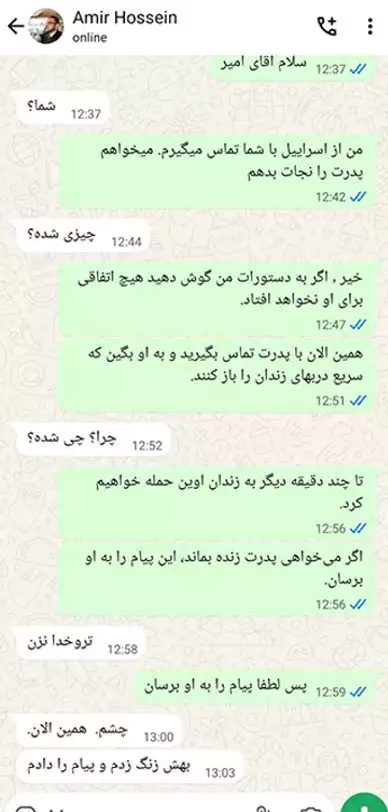Why Israel Bombed Iran's Evin Prison During the Conflict
It was a hybrid maneuver—where cyber contact, psychological pressure, and missile fire came together in a single, coordinated push.
After Israel’s bold airstrike on Tehran’s infamous Evin Prison, new details are coming to light—shedding insight into an extraordinary mix of digital diplomacy, last-minute escapes, and the human cost of the operation. Israeli intelligence tried a secret negotiation via WhatsApp before launching the attack, aiming to secure the release of political prisoners through a quiet deal rather than brute force.
WhatsApp Negotiation Before the Bombs
In a highly unconventional move, Israeli operatives reportedly reached out to Amir Hosseini Farzadi—the son of the prison’s commander, Ayatollah Farzadi—via WhatsApp. The message was clear: convince your father to open the gates and release political prisoners, or face the consequences.
"You have a few minutes," the Israeli agent warned. "Nothing will happen to him if he listens."
Alarmed, Amir alerted his uncle, who immediately rushed to Evin. Both men were seen fleeing the facility just moments before Israeli airstrikes began. Ayatollah Farzadi, a figure under U.S. sanctions since 2022, has not been seen or heard from since. His fate remains a mystery.
Devastation and Death Toll
The Iranian government has now confirmed that 71 people were killed in the strike, including prison staff, conscripts, detainees, visiting family members, and civilians in nearby residential areas. Among the dead was the president of the prison court.
The main prison gate was reportedly blown open—an act some observers interpret as both a symbolic and literal breach of the regime’s repressive apparatus. Many Iranian dissidents had been held in Evin, a facility long associated with political imprisonment.
From One Hell to Another: The Karchak Transfers
Following the attack, survivors were not freed—but relocated. Female prisoners were sent to the Karchak prison, 60 kilometers south of Tehran.
In a smuggled audio message, one prisoner lamented:
"The American and Israeli bombs didn’t kill us, but the Islamic Republic is killing us slowly in this place. It’s a gradual death."
Male detainees were transferred to Pashfafoya prison, another high-security site near the capital.
Regime Retaliation: Mass Arrests and Executions
In the aftermath of the Evin assault and a ceasefire in broader hostilities, Iran’s regime has cracked down hard. Over 1,000 people have been arrested, with several executions carried out on charges of espionage and “collaboration.”
While Israel has remained tight-lipped, analysts believe the strike was both tactical and symbolic—a direct message to Iran’s leadership and a rallying cry for those opposing the regime from within.
Digital Era War Tactic
It was a hybrid maneuver—where cyber contact, psychological pressure, and missile fire came together in a single, coordinated push. The attack on Evin may mark a turning point, not only in how intelligence is deployed, but in how regimes are challenged.
From secret chats to sirens in Tehran, the battle for Iran’s future is now being fought in code, airstrikes—and whispers through locked prison doors.






